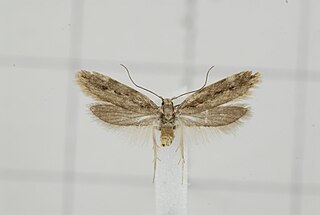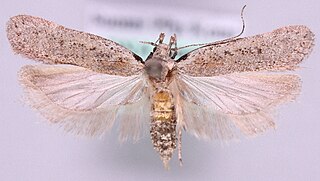
Cydia is a large genus of tortrix moths, belonging to the tribe Grapholitini of subfamily Olethreutinae. Its distinctness from and delimitation versus the tribe's type genus Grapholita requires further study.

Anarsia is a genus of moths in the family Gelechiidae.

Brachmia is a genus of the twirler moth family (Gelechiidae). Among these, it is mostly placed in the subfamily Dichomeridinae.

Dichomeris is a genus of moths in the family Gelechiidae erected by Jacob Hübner in 1818.

Ethmiopsis is a genus of the twirler moth family (Gelechiidae). Among these, it was previously assigned to subfamily Pexicopiinae, but later moved to the Chelariini tribe.

Gelechia is a genus of moths in the family Gelechiidae. The type species is Gelechia rhombella.

Helcystogramma is a genus of moths in the family Gelechiidae. The genus was erected by Philipp Christoph Zeller in 1877.

Udea is a genus of snout moths in the subfamily Spilomelinae of the family Crambidae. The genus was erected by Achille Guenée in 1845. The currently known 215 species are present on all continents except Antarctica. About 41 species are native to Hawaii.

Pyrausta is a speciose genus of moths of the family Crambidae. The genus was erected by Franz von Paula Schrank in 1802.

Ectropis is a genus in the geometer moth family (Geometridae). They are mostly paleotropical, but also plentiful in Australia and extend into Asia. Only one species – or cryptic species complex – is found in Europe. There are about 100 known species in this genus.

Perizoma is a genus in the geometer moth family (Geometridae). It is the type genus of tribe Perizomini in subfamily Larentiinae. The tribe is considered monotypic by those who include the genera Gagitodes, Martania and Mesotype in Perizoma. Some other less closely related species formerly placed here are now elsewhere in the Larentiinae, e.g. in Entephria of the tribe Larentiini.

Lecithocera is a genus of moths in the lecithocerid subfamily Lecithocerinae. The genus was erected by Gottlieb August Wilhelm Herrich-Schäffer in 1853.

Opogona is a genus of the fungus moth family, Tineidae. Therein, it belongs to the subfamily Hieroxestinae. As it includes Opogona omoscopa, the type species of the now-abolished genus Hieroxestis, it is the type genus of its subfamily.

Epinotia is a very large genus of tortrix moths. It belongs to the tribe Eucosmini of subfamily Olethreutinae.

The Oecophorinae are the nominate subfamily of moths in the concealer moth family (Oecophoridae). They are part of the insufficiently studied superfamily Gelechioidea, and like their relatives, the circumscription of this taxon is disputed.

Agonopterix is a moth genus of the superfamily Gelechioidea. It is placed in the family Depressariidae, which was often – particularly in older treatments – considered a subfamily of the Oecophoridae or included in the Elachistidae.

Autosticha is a genus of gelechioid moths. It belongs to the subfamily Autostichinae, which is either placed in the concealer moth family (Oecophoridae), or in an expanded Autostichidae. It is the type genus of its subfamily. Originally, this genus was named Automola, but this name properly refers to a fly genus in family Richardiidae.

Anacampsinae is a subfamily of moths in the family Gelechiidae.

















